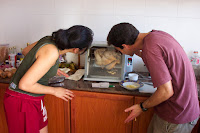Jonathon is a self-made business man. Just three years ago, he took a loan from a Lebanese man to buy a car. At the time he had neither prospective clients, nor the expectation that he would be able to pay his loan any time soon.
Today Jonathon is the sole proprietor of Jonathon’s Internet Café. His facility dons three computers with high speed internet (high speed, as in 128 kbps … enough to make a skype call) and a Vonage phone (a phone with a US number to that allows callers to pay US long distance rather than international roaming fees).
Equally impressive, is the booming taxi business Jonathon has built for himself. He is one of only a handful of drivers whom internationals call for transportation throughout Monrovia. His reputation has grown through word of mouth – as has his social capital. His clients routinely send him to the Roberts International Airport (RIA) where he is often the first face that new arrivals to Liberia meet.
Though Jonathon’s story is a success by any “up from your boot-straps” standard, he is faced with a challenge. Word of mouth and client-by-client growth is important, but how can he elevate his business to the next level? Taking a loan from a local bank is ill-advised; even keeping money in a bank account is considered risky (most people have a safe at home, or an alternate storage system).
This is where Susu plays a turn.
The “susu” is a group of like-minded business folk (men, most often) who enter into financial partnership. They agree to each devote a decided amount of money per day (maybe 200 Liberian Dollar, about 3.25 USD) to a Susu manager who holds the money for safe-keeping. At an agreed upon time interval (maybe once a week), that lump sum is given to a member of the Susu to use in a way that will promote his business. The cycle repeats until each member of the Susu has received his due.
“So you don’t actually make a profit,” I asked.
“Noooo, you put in as much as you get,” he says with a smile of understanding. Jonathon has infectious good humor – the kind that seems almost impervious to hard times, though I know he’s seen many.
“The advantage is that you make progress in a big way, like you couldn’t on your own.”
With Jonathon’s next Susu receipt, he plans to upgrade his car – an achievement that seemed wholly untenable only three years ago.















